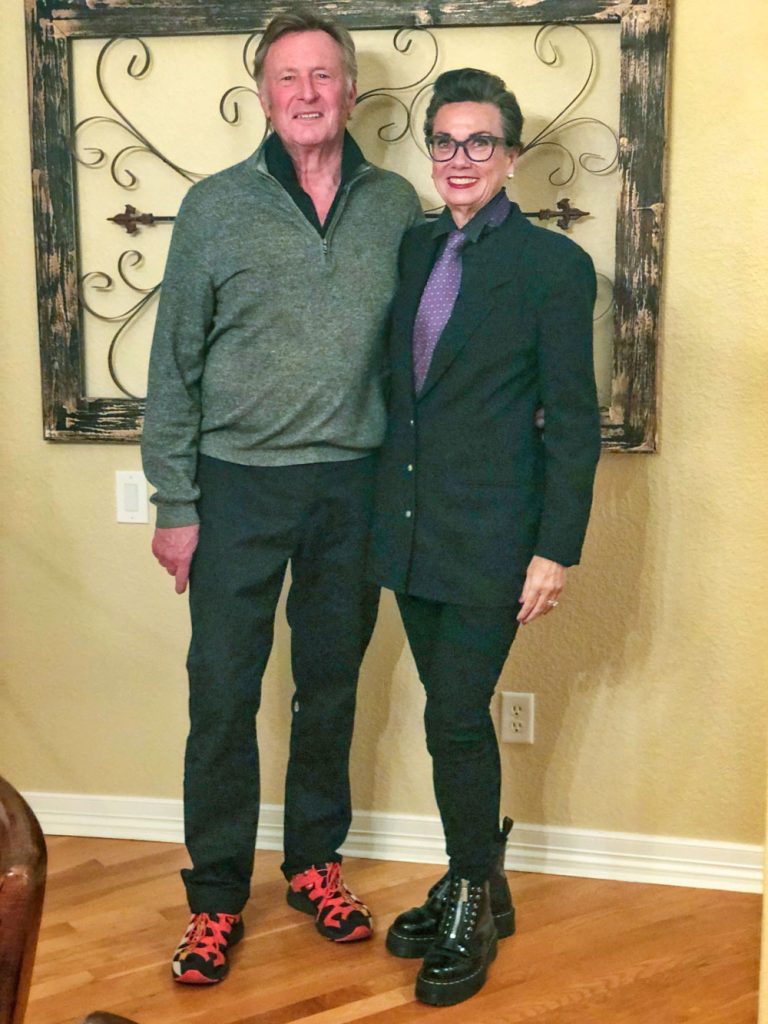Geri from Georgia
By Lisa Nicklanovich; courtesy photos

Geri Cline with her husband, Peter. Geri decided to wear a necktie for this photo because earlier in the day she had taught her students how to tie bow ties and neckties.
Upon meeting Geri Cline it’s easy to believe she has been teaching students, not just in traditional school environments, but in other more challenging places. What you would not believe is that she thought there was no life after 50.
Cline cared for her mother in their hometown of Moultrie, Georgia for three years before she died of ALS. “I was there through the whole ordeal. I had breast cancer during the last year of her life but it allowed me to be home with her. I thought my life was over at 50. I had no idea there was life beyond what I had been through.”
Cline needed a change, so she moved to Colorado in 2013, mainly because her two brothers live here. Since then, Cline has had a number of jobs, all making a difference in others’ lives. She met her husband, Peter, through the dating site ourtime.com. Full of life, Cline loves to socialize, spend time with her niece and nephew, and create art. She recently found time to create again after abandoning it years ago. “My medium is hand-building with clay; that’s my joy.” So, yes, she has debunked her earlier belief about life after 50.
As a teacher at the Denver Women’s Correctional facility, Cline taught life skills to the female prisoners. She said, “There were prisoners that were there for life and they still took classes in managing money, how to interview, and childcare.” Cline said she was never scared. “I thought I would be, but there was never a time where I felt unsafe or threatened.”

For Halloween, Cline said she dressed as a “dark angel with all gray hair because of the things we’d been through in 2020!” In addition to having annual Halloween parties, Cline loves skulls. Her interest grew from trips to Sturgis, South Dakota motorcycle rallies where she saw skulls everywhere. “I wear them and I have art with skulls in my home,” Cline added.
Cline also taught child development at Chaparral High School. She sent the students home with Baby Think It Over dolls as part of her class. The students had to take the doll out in public, put it in a car seat, and get up at all hours when the doll would cry. “My goal was to scare them. I set the babies to cry at 3 a.m. in the morning.”
Currently, Cline is the education liaison for Changes, a mental health program out of Denver Springs Psychiatric Hospital. Cline advocates for students ages 12-18 after they have been in an in-patient program at the hospital. These adolescents are struggling with addiction or mental health issues or often, both. Cline oversees the students’ classroom work as they prepare to re-enter their school, and she creates and teaches life-skills lessons. Cline described her students at Changes as “very intelligent and creative.”
Cline said she was shocked by the number of students who contemplate suicide. “I try to put them in a place where if they might self-harm, hopefully, I’ve made them stop and think forward to all the good things to come – that they have a future.”